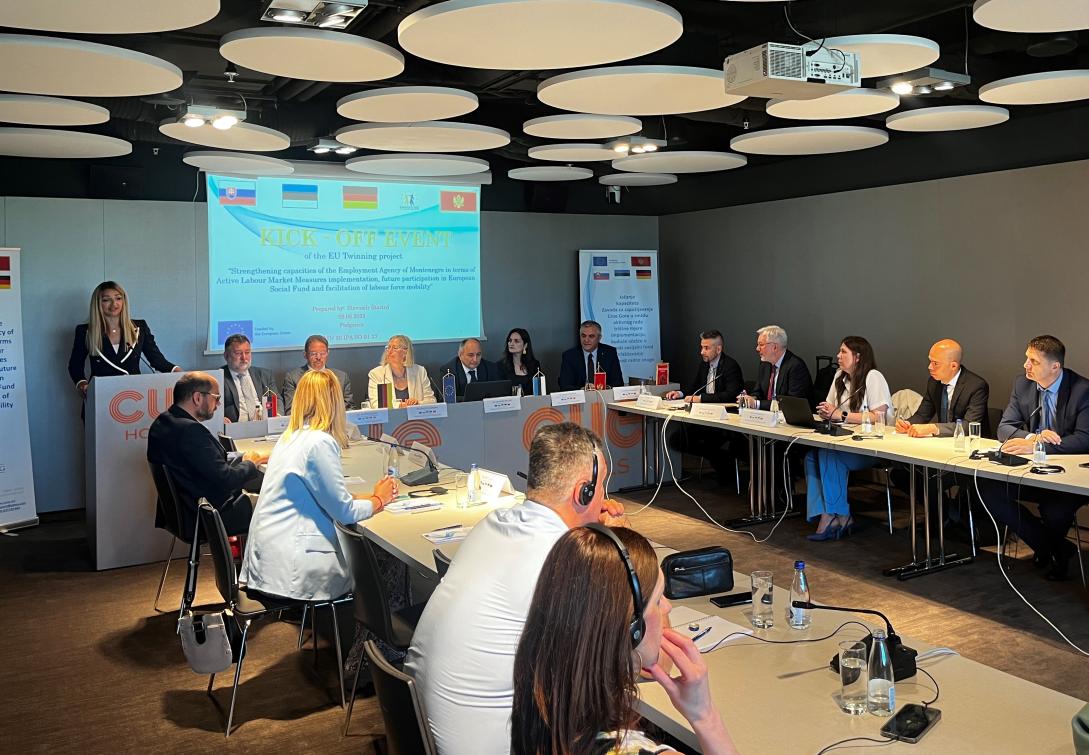EU support to the Employment Agency of Montenegro

"Strengthening capacities of the Employment Agency of Montenegro in terms of Active Labour Market Measures implementation, future participation in European Social Fund and facilitation of labour force mobility" is the name of the project that is being implemented with the help of the European Union and aims to improve the quality, capacity, efficiency and effectiveness of services of EAM in accordance with EU standards and best international practice. The Slovak Republic, the Republic of Estonia and the Federal Republic of Germany were selected as EU member states responsible for the implementation of the project worth 823,529 euros. The implementation period will last 18 months.
At the kick-off conference held on the occasion of the beginning of the implementation of the project, the representative of the Ministry of Labour and Social Welfare of Montenegro, Ivana Šućur, emphasized its importance for the labour market in Montenegro, as well as for the path to the EU membership. "During the 18 months of project implementation, efforts will be made to strengthen the operational and administrative capacities of the Employment Agency of Montenegro and the Ministry of Labour and Social Welfare to deal with active labour market policies, in order to fulfill their obligations required under the Joint Negotiating Position of Chapter 19 and Chapter 2," said Šućur.
The director of EAM, Gzim Hajdinaga, said that the project represents a continuation of successful cooperation with member states, which strengthens and deepens existing partnerships. At the same time, the project can serve as a model for EAM on how to apply the highest European and international standards, according to Hajdinaga.
Ambassador of Slovakia to Montenegro, Boris Gandel, said that Slovakia has always stood by Montenegro on its path to the EU and will continue with that practice. "Slovakia has fresh and useful experience in the areas covered by this Twining project – employment and active labour market policy, Youth Guarantee, European Social Fund and EURES, and we are ready to share it with you through this project. As you surely know, we are open people and apart from positive practices, we are also open to share with you the lessons learned, i.e. the mistakes we made so that you can learn from them and avoid them," Gandel said.
Ambassador of Germany to Montenegro, Peter Felten, said that the team of experts from his country is extremely motivated to work with Montenegrin partners within this Project and to make a significant contribution and support to the sustainable strengthening of the labour market in Montenegro.
Liselotte Isaksson, Deputy Head of Cooperation in the EU Delegation to Montenegro, said that social policies and employment measures are tools that help societies ensure social justice and give each individual an opportunity to prosper and achieve economic independence.
"These policies should empower people to progress in their lives, find new quality jobs, be socially included again and ideally move away from dependency on social support. Thus, the role of Public Employment Agencies is supporting and facilitating this is extremely important." Isaksson said.
The Director General of the Directorate for Financing and Contracting of EU Aid Funds (CFCU), Jelena Davidović, emphasized that the project is partially financed from the funds of the budget of Montenegro, and expressed the hope that its successful implementation will be a significant contribution to facilitating the mobility of workers and harmonization with EU legislation.
The conference itself was a unique opportunity to emphasise the importance of joint work on strengthening the capacities of the EAM by harmonising the real needs of the beneficiary country with EU requirements, said MS project leader Karol Jokl from Slovakia. His colleague from Germany, Thomas Thomma, reiterated that his country is determined to offer partnership, stability and support to Montenegro on its way to the EU, while the goal of the project is to build and improve administrative regulations and capacities in the area of supporting the free mobility of workers within the EU and in accordance with EU regulations.
"By sharing our knowledge and expertise, we can help our Montenegrin colleagues to identify effective solutions, develop customized approaches and implement policies that are in line with them," said Kadi Kanarbik, whose home country Estonia offers to EAM "insight into successful strategies, innovative approaches and lessons learned from their own experiences."
The Resident Twinning Advisor Slavomír Šťastný informed the attendees about the goals of the project and at the same time highlighted the most important activities planned until the end of the implementation within the three project components, with the aim of strengthening the operational and administrative capacities of the EAM and the competent Ministry in charge of the employment policies to deal with active labour market policies.





